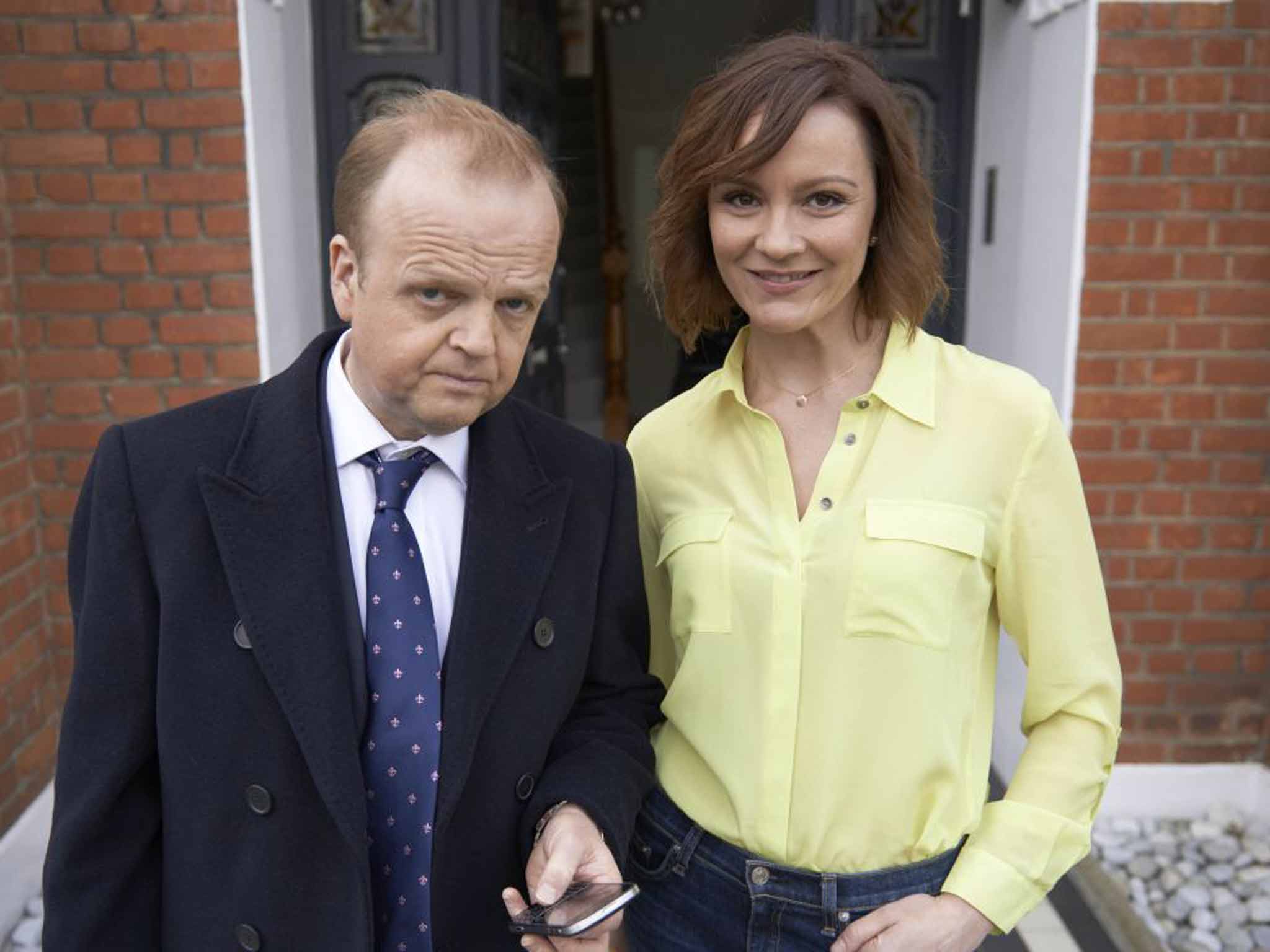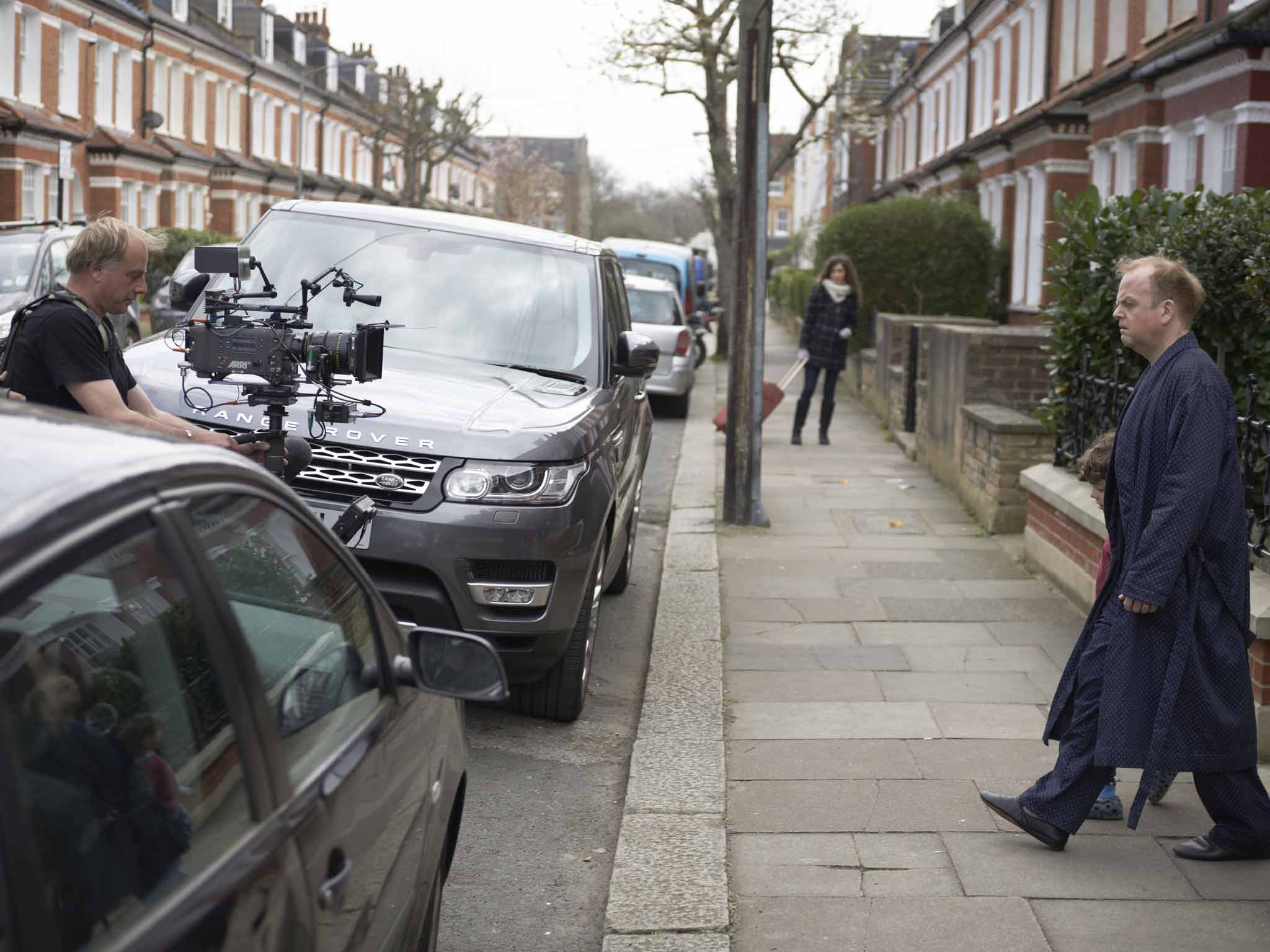Meet the cast of ‘Capital’, the BBC's adaptation of the state-of-the-nation novel
John Lanchester's 2012 s novel is now a drama starring Toby Jones and Rachael Stirling. They tell Gerard Gilbert why bankers can be nice people too

“Seven-bedroom, three-bathroom, double-fronted Edwardian villa overlooking Tooting Common. Offers in excess of £3.5m.” These property details could belong (if it were for sale) to the real house in which the BBC has been filming a three-part adaptation of John Lanchester's 2012 state-of-the-nation novel Capital.
Houses like this one were turned into bedsits after the First World War, before being-reconverted into spacious family homes only in the Nineties. A quick glance online at Zoopla estimates that the value of such a handsome, generously proportioned south London home will have risen by over £200,000 in the past year. No wonder that Britons, and Londoners in particular, are obsessed with bricks and mortar.
“I grew up in Hong Kong and we lived in flats owned by my father's employer [a bank],” says Lanchester, when we speak later. “One of the things you notice coming to Britain is how everyone is obsessed by property prices. It goes really deep.”
Lanchester's novel, which has been dramatised by Peter Bowker (of last year's Bafta-winning Marvellous), focused on the disparate residents of one gentrified south London street, the fictional Pepys Road, including a banker, a Polish builder, a Pakistani corner-shop owner, a Zimbabwean immigrant working illegally as a traffic warden, and a terminally ill widow, Petunia, who has lived in Pepys Road all her married life. All the residents are being insidiously menaced by postcards declaring that “We want what you have”.

“The image that came to mind when I started writing Capital was that the world presses on Britain and then Britain presses on London,” says Lanchester. “London then presses on each individual locality and you can see these big global themes... the inequality, the importance of finance the waves of demographic change... just by looking out of the window.”
Among Pepys Road's top earners is Roger Yount, a banker viewing Ibiza property porn on his computer as he dreams of how he's going to spend his bonus while his wife, Arabella has firmer plans for Roger's annual windfall and is instructing the Polish builder to rip out her newly installed wet room as she never uses it.
Played by Toby Jones and Rachael Stirling, Roger and Arabella are in the midst of a shouting match in the scene that I watch being filmed. Roger, who has just been told that his bonus is only a tiny fraction of what he has been expecting, is drunk and taking his anger out on the spendthrift Arabella. “Anything happen today?” he asks her with an impotent sarcasm worthy of Basil Fawlty berating Sybil. “Chip a nail in Pilates... drop a credit card in Waitrose?” In an earlier scene, Arabella gives as good as she gets, spurning Roger's bedroom advances with: “I'm no feminist, Roger, but a lecture in thrift does not constitute foreplay... ever.”
These lines belong to Bowker rather than Lanchester, Bowker saying he had to vocalise what, in the novel, were the characters' thoughts, and Capital reunites the dramatist with Toby Jones and Gemma Jones (who here plays Petunia) from his brilliant BBC drama Marvellous. For Toby Jones, Bowker's involvement was reassuring.
“You're told you're going to play a banker and you go, 'Oh, I know what this is going to be like...'” he says. “And that's stupid really because Peter's far too good a writer... quite apart from John being a great writer... to write a banker like all bankers are the same.
“Roger isn't an evil banker, he's a slightly complacent banker,” says Jones. “He's become used to a certain way of life and has a self-imposed pressure to live that way. I think what was so interesting is that you're playing a man whose job is changing without him realising it... his life seems to be rebelling. In that sense he could have been anybody.” To research the role, the production arranged for Jones to visit a real-life banker at work. “He was in charge of handing out the bonuses so had seen some of the more wayward reactions of bankers when they have been told the bonus that has been settled on,” says Jones. “I thought it was interesting that for all of the opulence and brilliant design in these offices, they are really sterile environments. There's a monastic and slightly sinister silence.”
Rachael Stirling is surprised that Arabella is seen as the less sympathetic of the Younts. “It's interesting that people point the finger at her for being the materialistic one and not Roger,” she says. “That it's the woman who's villainised in this relationship.”
John Lanchester agrees with Stirling. “Arabella has this important quality in that she wants life to be easy, and in my book that's a positive quality,” he says. “Most people like making heavy weather of things, and one of things I enjoy about this adaptation is that her likeability is like the likeability she has in my head.”
Capital's other characters include the aforementioned Petunia, her daughter Mary (Lesley Sharp) and grandson Smitty (Robert Emms), a Banksy-style anonymous street artist. There is also local shopkeeper Ahmed (the excellent Adeel Akhtar), traffic warden and asylum seeker Quentina (Wunmi Mosaku) and Polish builder Bogdan (Rad Kaim), although soccer-loving Bowker and Lanchester quickly, if reluctantly, agreed to omit the character of a talented young Senegalese footballer Freddy Kamo.
“Football is notoriously hard to do convincingly on television,” says Bowker. “Since he's a prodigy you either don't show his legs or you show the legs of another talented footballer.”
Bowker says that before adapting Capital he was a fan of Lanchester's financial journalism, and in particular his 2010 book explaining the 2007-2010 financial crash, Whoops! Why Everyone Owes Everyone and No One Can Pay. “Capital is set just before the crash and what's interesting how little has changed,” says Bowker. “It seems to me that we've now got an economic recovery that is entirely predicated on property prices.” Lanchester himself says that he started “noodling” with the ideas for Capital in 2005, when he sensed a crash was on the way. “I was right and wrong though,” he says. “It turned out to be a much bigger, scarier crash than I anticipated but I did think it would also be a London property-bubble crash – and one of the ironies is that that is roaring away as if nothing happened. And huge swathes of the country still feel really battered as if they're never going to recover.”
Indeed, and I ask Peter Bowker whether he thinks that Capital will play differently in London to other parts of the UK. “Obviously there might be 10 per cent more recognition factor in London of how tightly packed poverty and riches are in London – real cheek-by-jowl stuff. I'm from Stockport near Manchester and in the big northern cities what you tend to get is suburban life quite separate from inner-city life, whereas in London it's more mixed up.”
And immigration is a national concern, says Bowker. “I'm filming something in the Lakes at the moments and there's as much Eastern European labour working in the hotel industry as there is working in the building industry in London, percentage wise.”
On the whole, though, he hopes there's a sufficient fascination with the state of the country's capital, “Rather than 'I don't want to see something about those fucking London bastards'.”
Although Lanchester says that his fictional Pepys Road is a composite of various London neighbourhoods, Toby Jones locates a street in Clapham Old Town, about a mile and a half from his own home in Stockwell. “The attractions of the story for me was it was a way of understanding my postal code,” he says. “My kids go swimming, I go to the hairdresser's on the very street that John wrote about in the book.
“The greatness of the city is the fantastic diversity of the population, the chaos of the topography of the city... the hugger-mugger economics. That's what I love about raising my children here, it's that they can't avoid so many aspects of the world... the world constantly intrudes upon them.
“One worries that if people just cash in and leave the city, or people buy apartments as investments and don't bother to live in them. But that's an issue not just for London but other cities. I was working in Vancouver a year and a half ago [on Wayward Pines] and they have people flying over in helicopters, not even bothering to land and buying property.”
But if Jones worries about London's affordability, Lanchester has a word to the wise for would-be purchasers considering shackling themselves to a sky-high mortgage – he predicts the property correction that he called wrongly in 2005. “It's astonishing that we're back in another property bubble,” he says. “If we'd had this conversation in 2010 or 2011 I think I would have said it was very much a novel about an historical moment that would never come back. I was wrong.”
'Capital' begins on 24 November at 9pm on BBC1
Join our commenting forum
Join thought-provoking conversations, follow other Independent readers and see their replies
Comments
Bookmark popover
Removed from bookmarks